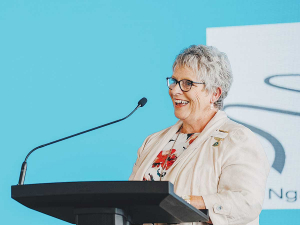Applications Open for 2026 NZI Rural Women Business Awards
Applications are now open for the 2026 NZI Rural Women Business Awards, set to be held at Parliament on 23 July.
 RWNZ national president Gill Naylor said the organisation would be joining the fight against ovarian cancer in a webinar last week.
RWNZ national president Gill Naylor said the organisation would be joining the fight against ovarian cancer in a webinar last week.
Rural Women New Zealand (RWNZ) say they are joining the fight against Ovarian Cancer.
At a webinar on Thursday 5 March, RWNZ national president announced the organisation’s national project for 2021 would be ovarian cancer funding and awareness.
“We aim to raise both funding for and awareness of the symptoms and the disease itself,” Naylor said.
She said the organisation would be collaborating with charities like Cure Our Ovarian Cancer and Talk Peach to achieve those aims.
“Ovarian cancer is a nearly invisible health crisis in New Zealand,” Naylor said.
“There is little awareness and not much research or information available and the government and not-for-profit funding is almost non-existent.”
“Women need to have the knowledge so that they can have more effective conversations with their doctor.”
Naylor said that, on average, women with ovarian cancer will see their doctor four times before receiving the proper tests – like a blood test or an ultrasound – to investigate the causes of their symptoms.
Jane Ludemann, founder of Cure Our Ovarian Cancer, said her organisation did much work in rural communities, including the distribution of symptom education, educating rural doctors and nurses, and advocating for the improvement of rural care and access to rural medical services.
“It’s really important that women know the symptoms so that they know when to tell their doctor about ovarian cancer.”
“Whether your doctor is two streets away or 30km down the road, we want to ensure that every woman understands and knows the essentials about ovarian cancer and that their doctors do too.”
Tash Crosby, founder of Talk Peach, told the virtual audience that being diagnosed with ovarian cancer could be “isolating”.
“I don’t want anyone else to feel any of the isolation that I felt upon being diagnosed,” Crosby said.
Former Fonterra executive Alex Turnbull has been appointed CEO to lead all five Yili Oceania Business Division companies in New Zealand.
Fonterra executive René Dedoncker is leaving the co-operative later this year to lead Australian agribusiness Elders.
Alliance Group and the Southland Stags rugby team have joined forces in a partnership that will see the the meat co-operative's farmgate brand feature on players' team kits and replica jerseys.
Fonterra's plan to expand its organic programme to the South Island is being well received by farmers, the co-op says.
Voting has started for the renewal of DairyNZ's milksolids levy.
The most successful catchment groups in NZ are those that have 'a source to sea' approach.

OPINION: Here w go: the election date is set for November 7 and the politicians are out of the gate…
OPINION: ECan data was released a few days ago showing Canterbury farmers have made “giant strides on environmental performance”.